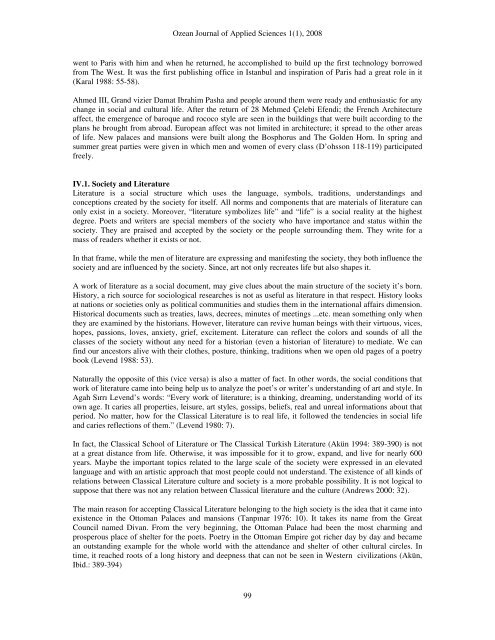Journal of Applied Science Studies - Ozean Publications
Journal of Applied Science Studies - Ozean Publications
Journal of Applied Science Studies - Ozean Publications
You also want an ePaper? Increase the reach of your titles
YUMPU automatically turns print PDFs into web optimized ePapers that Google loves.
<strong>Ozean</strong> <strong>Journal</strong> <strong>of</strong> <strong>Applied</strong> <strong>Science</strong>s 1(1), 2008<br />
went to Paris with him and when he returned, he accomplished to build up the first technology borrowed<br />
from The West. It was the first publishing <strong>of</strong>fice in Istanbul and inspiration <strong>of</strong> Paris had a great role in it<br />
(Karal 1988: 55-58).<br />
Ahmed III, Grand vizier Damat Ibrahim Pasha and people around them were ready and enthusiastic for any<br />
change in social and cultural life. After the return <strong>of</strong> 28 Mehmed Çelebi Efendi; the French Architecture<br />
affect, the emergence <strong>of</strong> baroque and rococo style are seen in the buildings that were built according to the<br />
plans he brought from abroad. European affect was not limited in architecture; it spread to the other areas<br />
<strong>of</strong> life. New palaces and mansions were built along the Bosphorus and The Golden Horn. In spring and<br />
summer great parties were given in which men and women <strong>of</strong> every class (D’ohsson 118-119) participated<br />
freely.<br />
IV.1. Society and Literature<br />
Literature is a social structure which uses the language, symbols, traditions, understandings and<br />
conceptions created by the society for itself. All norms and components that are materials <strong>of</strong> literature can<br />
only exist in a society. Moreover, “literature symbolizes life” and “life” is a social reality at the highest<br />
degree. Poets and writers are special members <strong>of</strong> the society who have importance and status within the<br />
society. They are praised and accepted by the society or the people surrounding them. They write for a<br />
mass <strong>of</strong> readers whether it exists or not.<br />
In that frame, while the men <strong>of</strong> literature are expressing and manifesting the society, they both influence the<br />
society and are influenced by the society. Since, art not only recreates life but also shapes it.<br />
A work <strong>of</strong> literature as a social document, may give clues about the main structure <strong>of</strong> the society it’s born.<br />
History, a rich source for sociological researches is not as useful as literature in that respect. History looks<br />
at nations or societies only as political communities and studies them in the international affairs dimension.<br />
Historical documents such as treaties, laws, decrees, minutes <strong>of</strong> meetings ...etc. mean something only when<br />
they are examined by the historians. However, literature can revive human beings with their virtuous, vices,<br />
hopes, passions, loves, anxiety, grief, excitement. Literature can reflect the colors and sounds <strong>of</strong> all the<br />
classes <strong>of</strong> the society without any need for a historian (even a historian <strong>of</strong> literature) to mediate. We can<br />
find our ancestors alive with their clothes, posture, thinking, traditions when we open old pages <strong>of</strong> a poetry<br />
book (Levend 1988: 53).<br />
Naturally the opposite <strong>of</strong> this (vice versa) is also a matter <strong>of</strong> fact. In other words, the social conditions that<br />
work <strong>of</strong> literature came into being help us to analyze the poet’s or writer’s understanding <strong>of</strong> art and style. In<br />
Agah Sırrı Levend’s words: “Every work <strong>of</strong> literature; is a thinking, dreaming, understanding world <strong>of</strong> its<br />
own age. It caries all properties, leisure, art styles, gossips, beliefs, real and unreal informations about that<br />
period. No matter, how for the Classical Literature is to real life, it followed the tendencies in social life<br />
and caries reflections <strong>of</strong> them.” (Levend 1980: 7).<br />
In fact, the Classical School <strong>of</strong> Literature or The Classical Turkish Literature (Akün 1994: 389-390) is not<br />
at a great distance from life. Otherwise, it was impossible for it to grow, expand, and live for nearly 600<br />
years. Maybe the important topics related to the large scale <strong>of</strong> the society were expressed in an elevated<br />
language and with an artistic approach that most people could not understand. The existence <strong>of</strong> all kinds <strong>of</strong><br />
relations between Classical Literature culture and society is a more probable possibility. It is not logical to<br />
suppose that there was not any relation between Classical literature and the culture (Andrews 2000: 32).<br />
The main reason for accepting Classical Literature belonging to the high society is the idea that it came into<br />
existence in the Ottoman Palaces and mansions (Tanpınar 1976: 10). It takes its name from the Great<br />
Council named Divan. From the very beginning, the Ottoman Palace had been the most charming and<br />
prosperous place <strong>of</strong> shelter for the poets. Poetry in the Ottoman Empire got richer day by day and became<br />
an outstanding example for the whole world with the attendance and shelter <strong>of</strong> other cultural circles. In<br />
time, it reached roots <strong>of</strong> a long history and deepness that can not be seen in Western civilizations (Akün,<br />
Ibid.: 389-394)<br />
99

















